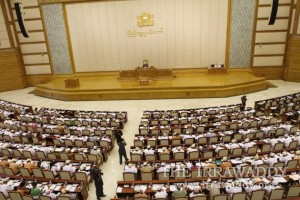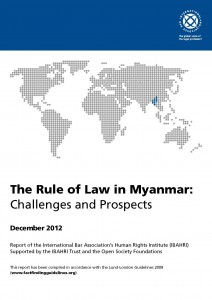Posts Tagged ‘Reform’ (13 found)
British Government Still In Denial About Reality Of Burma Reforms
Following a debate on human rights in Burma in the British Parliament yesterday evening, Burma Campaign UK today accused the British government of being in denial about the reality of the reform process in Burma. Burma Campaign UK called on the British government to formally accept that the reform process in Burma has stalled, that the process is not a transition to democracy, and to change policy accordingly. […]
• • •Ethnic Conflict in Burma/Myanmar: From Aspirations to Solutions
In November, TNI/BCN hosted a two-day seminar, involving ethnic groups from different regions of Burma, on the theme of “Ethnic Conflict in Burma/Myanmar: From Aspirations to Solutions”. Those participating included 20 representatives from Burmese civil society, political and armed opposition groups.
The seminar focused on four main areas: political reform; moving from ceasefires to political dialogue; land rights and natural resource extraction; and ethnic identity and citizenship […]
• • •68th Session of the UN General Assembly – Situation of human rights in Myanmar: Report of the Special Rapporteur on the situation of human rights in Myanmar, Tomas Ojea Quintana
In the present report to the United Nations General Assembly, the Special Rapporteur describes how the reforms under way in Myanmar continue to create the prospect of significant improvements in the human rights situation. Important developments during the reporting period include the continuing release of prisoners of conscience; improving respect of the right to freedom of opinion and expression; and progress towards agreement on a national ceasefire. The Special Rapporteur highlights, however, the dangers of glossing over shortcomings in the area of human rights or presuming that these shortcomings will inevitably be addressed through the momentum of current reforms […]
• • •Conflicting Realities: Reform, Repression and Human Rights in Burma
This report by the Subcommittee on International Human Rights is intended to recognize the important achievements brought about as part of Burma’s reform process, in particular the election of Daw Aung San Suu Kyi and other candidates from the NLD as Members of Parliament (MP) this April. At the same time, we wish to warn against hasty or irresponsible optimism and to sound the alarm about the lack of civilian control over the Burmese military, which has very serious human rights and humanitarian consequences. Recent progress has not yet extended to all parts of the country, nor to all of the people of Burma. Going forward, we believe that it is important for the international community to look beyond central Burma in assessing the depth and sincerity of the country’s reforms. Respect by the Burmese government and military for human rights and international law in Burma’s ethnic minority
areas will be the real measure of change in the country and should inform any decision regarding the permanent removal of sanctions by Canada […]
Nobel Peace Laureates: A True Democratic Future in Burma Will Require Reconciliation
Burma has taken important steps in the past two years to move from decades of repression toward a democratic future. Many, though not all, political prisoners have been conditionally released. Our fellow Nobel Laureate Aung San Suu Kyi was freed from house arrest, and the National League for Democracy now has seats in parliament after contesting last year’s by-elections. The government has also taken some positive steps toward economic reform […]
• • •Reforming Telecommunications in Burma
In January 2013, the Burmese government announced plans to liberalize the country’s telecommunications sector and invited bids for two nationwide telecommunications licenses.[1] Successful bidders will be allowed to provide a range of services, including mobile and Internet services […]
• • •A Year of Nascent Reforms to Build Upon
 2012 has been an eventful year for Burma – a year of initial steps hopefully in the right direction as well as several hurdles that pose serious challenges to the reform process.
2012 has been an eventful year for Burma – a year of initial steps hopefully in the right direction as well as several hurdles that pose serious challenges to the reform process.
In April, Daw Aung San Suu Kyi and 42 other members of the National League for Democracy won their parliamentary seats in a landslide victory for the party. However, parliamentary procedures are obscure and NLD and other progressive MPs are outnumbered by those from the Union Solidarity and Development Party and the military, making it difficult to raise important issues, repeal oppressive laws or push for amendments to draft legislations.
This year, we have seen the release of a significant number of political prisoners. While the freedom of these crucial players in the democratic process was welcomed, the opportunistic nature of the releases and the existing charges against those released cast a dark shadow. Hundreds of political prisoners remain in jail and authorities continue to arrest outspoken activists, including most recently those who have protested against the Letpadaung copper mine, one of many cases of land confiscation throughout the country […]
The Rule of Law in Myanmar: Challenges and Prospects
 Myanmar is on the cusp of major reforms, but it needs to confront and overcome the legacy of its recent past if those reforms are to make progress. In order to understand Myanmar’s prospects and needs at this important juncture and, more specifically, to find out how far it has begun to adhere to globally prevalent understandings of the rule of law, the International Bar Association’s Human Rights Institute (IBAHRI) sent a delegation to the country’s major cities on a fact-finding mission between 11 and 18 August 2012. Its assessment and conclusions are laid out in this report […]
Myanmar is on the cusp of major reforms, but it needs to confront and overcome the legacy of its recent past if those reforms are to make progress. In order to understand Myanmar’s prospects and needs at this important juncture and, more specifically, to find out how far it has begun to adhere to globally prevalent understandings of the rule of law, the International Bar Association’s Human Rights Institute (IBAHRI) sent a delegation to the country’s major cities on a fact-finding mission between 11 and 18 August 2012. Its assessment and conclusions are laid out in this report […]
Myanmar – IBAHRI Report Encourages Generous But Vigilant International Support in Reform Process
In a new report released today, the International Bar Association’s Human Rights Institute (IBAHRI) urges international organisations and foreign governments to lend crucial support to the reform process in Myanmar (Burma), but warns that any assistance must be targeted carefully so as to include all sections of the country’s population […]
• • •Video: Khin Ohmar’s Burma Trip Conclusion (Interview)
Khin Ohmar talks to Radio Free Asia’s Reporter at the conclusion of her first Burma visit in 24 years.
• •








 All posts
All posts